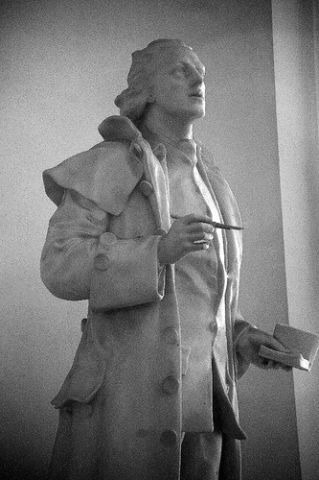 William Williams Pantycelyn (1717-Jan 11, 1791) is the most accomplished Welsh hymn writer. Old books describe him variously as “the Charles Wesley of Wales,” “the Isaac Watts of Wales,” or “the Paul Gerhardt of Wales.”
William Williams Pantycelyn (1717-Jan 11, 1791) is the most accomplished Welsh hymn writer. Old books describe him variously as “the Charles Wesley of Wales,” “the Isaac Watts of Wales,” or “the Paul Gerhardt of Wales.”
Williams, who took on the bardic name Pantycelyn from the place of his birth, was prolific as a poet. He was an important minister in the second generation of the eighteenth century (methodist) evangelical awakening in Wales, participating as a preacher but also shaping congregational worship more broadly through his popular hymns. There is some biographical information about him in the book Sweet Singers of Wales.
His hymns, though many, circle around and around just a few themes: life as a journey, the world as a hard place filled with dangerous petty pleasures, the faithfulness of God, the love of Jesus, and the soul’s awe-struck response of wonder at what God has done in redemption. He worked these themes over and over, so his poetry is best taken in small doses. Landscape and weather somehow sneak into much of his work, and a typological reading of the Old Testament is part of his basic poetic grammar.
Nearly all of these elements are in evidence in his greatest hit, “Guide me, O Thou great Jehovah.” You can see it in its original setting at the end of a collection of his hymns used by George Whitefield (“Guide Me” is hymn 72, the final hymn, in the second collection).
Guide me, O Thou great Jehovah,
Pilgrim through this barren land.
I am weak, but Thou art mighty;
Hold me with Thy powerful hand.
Bread of Heaven, Bread of Heaven,
Feed me till I want no more;
Feed me till I want no more.Open now the crystal fountain,
Whence the healing stream doth flow;
Let the fire and cloudy pillar
Lead me all my journey through.
Strong Deliverer, strong Deliverer,
Be Thou still my Strength and Shield;
Be Thou still my Strength and Shield.Lord, I trust Thy mighty power,
Wondrous are Thy works of old;
Thou deliver’st Thine from thralldom,
Who for naught themselves had sold:
Thou didst conquer, Thou didst conquer,
Sin, and Satan and the grave,
Sin, and Satan and the grave.When I tread the verge of Jordan,
Bid my anxious fears subside;
Death of deaths, and hell’s destruction,
Land me safe on Canaan’s side.
Songs of praises, songs of praises,
I will ever give to Thee;
I will ever give to Thee.Musing on my habitation,
Musing on my heav’nly home,
Fills my soul with holy longings:
Come, my Jesus, quickly come;
Vanity is all I see;
Lord, I long to be with Thee!
Lord, I long to be with Thee!
tomorrow, January 12: Aelred of Rielvaux